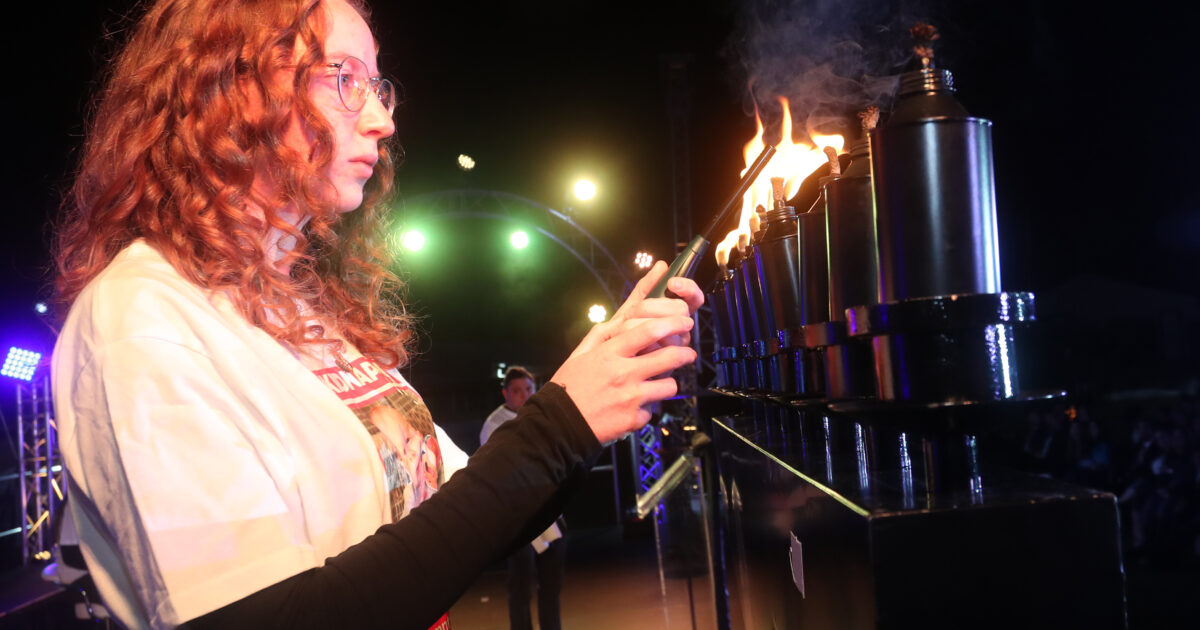Featured Item
Force for good: poignant ceremony salutes heroic soldiers

When news of the massacre at the hands of Hamas in Israel on 7 October filtered down to Omer Cohen*, who was living in Cyprus, he didn’t think twice before getting on a plane home to defend his country.
When he heard that his close army friend, Ben, had been at the Supernova festival and hadn’t been heard from since the massacre, he was even more determined to get back into the army.
And it was to salute the many heroes who had fallen in the past seven months that Cohen was willing to fly out to South Africa to speak at the Yom Hazikaron ceremony at Yeshiva College on 12 May. He wanted to share the stories of his friends, Ben, one of 1 200 killed on 7 October, and Netanel, a soldier in his unit who was one of the 650 soldiers killed in the war since 7 October.
Cohen told hundreds of people who came to Yeshiva College on Sunday evening that he had been injured during Operation Protective Edge in 2014 but had recovered and chose to participate in this war as a senior combat paramedic in honour of those who died on 7 October.
He’s a part of the elite Yahalom Special Combat Engineering Unit, whose main focus is on entering the Hamas terror tunnels and dealing with the horrors that lie therein.
Members of youth movements lit candles at the memorial for fallen Israel Defense Forces (IDF) soldiers and victims of terror attacks, with particular mention of Daniel Perez, who grew up in South Africa and lost his life fighting Hamas terrorists on 7 October. His body is still being held captive in Gaza.
Cohen heard that his friend, Ben, had gone to party at the Supernova festival on 6 October. “Two days later, a friend told me that Ben never left the Nova festival,” he said. Cohen later found out that Ben had fought off Hamas terrorists at the festival as best he could, even taking weapons off the bodies of fallen soldiers so that he could try to fight back against the crazed terrorists. Cohen later found out that his friend was one of the 1 200 people killed on 7 October.
He told the story of Netanel, a commander in an elite unit in the IDF, who gave up his rank as a commander so that he could go into Gaza and defend his country. After serving in Gaza for a month, it was time for his unit to return to Israel. One of the protocols before leaving the building they were working from was that the soldiers had to make sure that there was nobody in it so they could demolish it to ensure that terrorists couldn’t re-enter the building and attack IDF soldiers.
Rotem, the deputy commander, entered the building to do some last checks that it was safe to demolish when suddenly, two terrorists jumped out and started shooting at him. Cohen said Netanel ran into the building to try and save his deputy commander. When he reached Rotem, another gunshot rang out, and Netanel was hit in the chest and died a few minutes later.
Chief Rabbi Dr Warren Goldstein told the gathering that though many in the world claim to grieve for all those brutally murdered on 7 October and since the establishment of Israel in 1948, they make the point that they won’t grieve for the soldiers.
“There are a lot of people in the world who have sympathy when Jews are dying,” he said. “They’ll say, ‘Never again!’, they’ll cry for the Holocaust, they’ll cry for 7 October, and they’ll come and hug the Jewish people. But we’re here tonight on this Yom Hazikaron to say that our hearts are in pain for all of the victims of terror, but we’re also here to pay tribute to the fallen soldiers, the real heroes of Am Yisrael.
“Every Yom Hazikaron is filled with pain, but this Yom Hazikaron is the most painful of all,” Goldstein said, because since 7 October, so many Israeli soldiers have given their lives to fight the darkest form of barbarism, and their actions are in the name of making the world a better place.
Adi Cohen-Hazanov, the deputy Israeli ambassador, told the crowd the war Israel was fighting was “forced upon us”.
“Our enemies have once again challenged our natural right of independence, and we’re still mourning the death of civilians who were murdered in their homes, the young people who were massacred at a music festival, and the death of the brave soldiers who rushed in to rescue them,” she said.
“The Israel Defense Forces is a powerful army, not only because of its advanced capabilities and innovative technology. The source of the army’s strength is its people. Our army is made up of diverse societies of Israelis fighting for one common goal,” Cohen-Hazanov said.
Cohen made the final point that he believed his friends who had fallen would have wanted us “to love each other and to be united because only when we’re united, only when we act as one person, can we defeat our enemies and live our best lives”.
*Omer Cohen is not his real name. His name was changed for his security.
